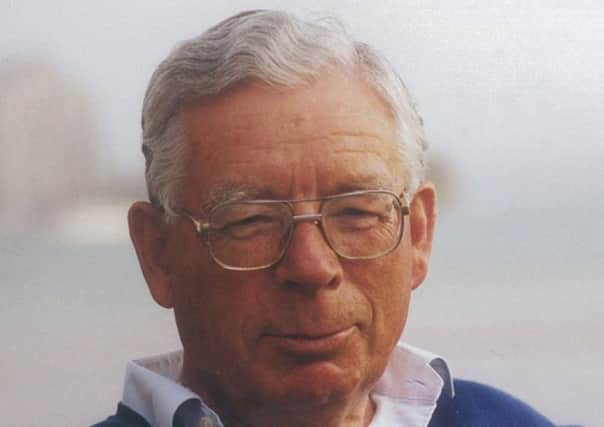Obituary: Archie Rennie, public servant


Archie Rennie was the archetypal Scottish lad o’ pairts. Born the son of a railway signalman, he became Registrar General for Scotland and then the head of the Scottish Home and Health Department. In his long retirement he held several senior positions, both national and local. The constant theme throughout his life was service to the community.
The almost continuous thread running through his civil service career was his commitment to the National Health Service, which was being set up as he joined the Department of Health for Scotland in 1947. From its very beginning Archie was there: from the initial challenges of setting up a completely new structure and taking the medical profession with it, through the excitements of the massive hospital building programme in the 1960s to the controversies over the building of Ninewells and other teaching hospitals, and the upheavals and reorganisations of the 1970s.
Advertisement
Hide AdAdvertisement
Hide AdThe health service played to his administrative and diplomatic strengths, dealing simultaneously with the medical and nursing professions, architects, contractors, professors, and the royal colleges and universities – not to mention ministers and colleagues in Whitehall and St Andrews House. He succeeded in getting them all on side as he wrestled with the problems in Scotland’s big cities of funding the teaching hospitals at the same time as improving services for the country at large in the district general hospitals. So it was fitting that 30 years after joining, in 1977 he became the head of the Scottish Office Home and Health Department. There his diet of health issues was supplemented by the pressures of police and law and order and the challenges of prisons. And to all of these was added the ultimately abortive efforts of preparing for the Scottish Assembly, which fell at the referendum in 1979.
As was normal in the Scottish Office, Archie held positions in various departments during his career, including a spell as the Secretary of State’s Private Secretary from 1961 to 1963, Registrar General in charge of the 1971 Census, and Under Secretary in the new Scottish Economic Planning Department, where he oversaw the setting up of the Scottish Development Agency (now Scottish Enterprise).
In all this work he had the great advantage of being trusted absolutely by ministers. They knew that he would tell it to them as he saw it, however inconvenient – “talking truth unto power” – and would be indefatigable in trying to achieve their objectives. He was completely apolitical.
For Archie, being a civil servant was not just a job, it was a vocation. He was proud to have been “a St Andrews House man”, and like so many of his colleagues there he dedicated his working life to public service and making Scotland a better place
His interests went well beyond the good conduct of public business. He loved words, and in the 1950s was an active member of the Speculative Society, founded in 1763 for the purpose of “improving the arts of literary composition and public speaking”. Later in life he joined the Order of the Monks of St Giles, a group dating from the 19th century of writers of light verse. His long membership of the Scottish Arts Club reflected his keen interest in Scottish contemporary art. And he was one of the founding members of the Blacket Association, and thus a driving force in the establishment of Edinburgh`s first Conservation Area.
He did not so much retire in 1984 as change career, and he was much in demand where good judgment and diplomatic skills were needed. He was finance convener and Chancellor’s assessor on the Court of St Andrews University, and the University rewarded him with an Honorary LL.D, which he valued highly. He chaired an inquiry into the pay of the uniformed services in Hong Kong, the conclusions of which were not uncontroversial. For almost ten years he was vice chairman of the Advisory Committee on Distinction Awards for medical consultants, and he was chairman of the fund set up to support victims of the Lockerbie tragedy. He was indeed a man for all seasons.
Retiral had enabled a move to Elie, in Fife, and he gave the community there much service over the years. He was a Director and then Chairman of the Harbour Trust; member and then Chairman of the Community Council, and Commodore of Elie and Earlsferry Sailing Club, where he was much involved in the construction of a new clubhouse. In 2008, when well into his 80s, the Elie History Society published his definitive history of the local harbours, the product of years of careful research.
Archie was born in Guardbridge, Fife, to John, a railway signalman, and Isabella (nee Louden) Rennie. Until he went to secondary school at Madras College in St Andrews he was known to all as Louden, by which name he is still known by his siblings and their descendants. He went on to study Physics at St Andrews University, where he was President of the Students Representative Council. Whilst there he met Kathleen Harkess, a student of political economy (and subsequently a lecturer at Aberdeen University and, later, at Edinburgh University), whom he married in 1950. In 1944 he joined the Admiralty as a scientist developing mine counter-measures, and served there until he joined the civil service.
Advertisement
Hide AdAdvertisement
Hide AdAt home he was a keen gardener, and took great pride in eating vegetables that he had grown himself, even when in his 90s. He had a strong practical bent and undertook all sorts of ambitious projects, in particular woodwork but also including building stone walls. Small boat sailing was a strong interest for over half his life, beginning at Fisherrow and then for many years at Elie, where he loved messing about in boats.
Archie is survived by Kathleen, his four sons, nine grandchildren and four great-grandchildren.
PM and JAR